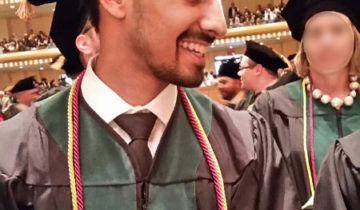In wake of the recent attacks on Mumbai, I found myself more concerned than I expected over the welfare of the victims, and especially of the local Indians. Not typically callous to or ignorant of woes and tragedies that befall my fellow humans around the world, but I was certainly more drawn to the news stories, to the many posts and to the general press coverage than anticipated.
Since those attacks, I have pondered the reasons for this. I think it must be because of chickenmonkeydog. As you may know, we have a readership that includes a number of individuals in or from India and Pakistan. And through their comments on this site and on their respective blogs, I have come to know more about and be more interested in India, Pakistan and the people in that corner of the world. No, I didn’t ignore it beforehand – one of my closest friend in the UK is a native Indian – but it certainly wasn’t in my ‘Top Corners of the World’.
Something similar happened years ago when I began to work with Survivors Fund, an organisation dedicated to assisting survivors of the Rwandan genocide. Suddenly, Africa became much more than a geographic location with places and peoples of the world. It became very human, a place filled with personal stories, personal histories, personal tragedies and, of course, personal futures.
With so many demands on our attention (family, friends, jobs, the economy in today’s market, homelands, etc.), it’s easy to overlook much of what is going on in the world. I don’t say this as a criticism, but more of a statement of practical reality. (The street riots in Jos, Nigeria, have barely made the news in the wake of the assault on Mumbai.)
The internet has given us the ability not only to learn about the comings and goings of people and places around world, but also to connect and interact with those with whom we might otherwise never have crossed paths. And that can only be a good thing.





Couldn’t agree more, but I would like to add something else. We should also need to explore the alternative media for a different perspective on things and as everything is just a click away, it is much easier than before.
@ Tazeen –
Alternative media is another added benefit of the net, that’s for sure. The problem that I find is trying to locate a reliable and knowledgable source of information. The majority of ‘news’ blogs just regurgitate the same stories with the same take as the major news sites. Very few ‘news bloggers’ take the time and energy to offer in depth analysis.
So, what alternative news blogs or sites would you recommend?
Liam:
I studied the concepts of causation and ‘the idea whose time has come’ for my doctoral work. Linear/ rational models do not come close to explaining why things happen when they do. The sad thing about horrid events is that those, who raise warnings, are often ignored, but like Cassandra, they are often right in the end, when even they wish they weren’t right.
The Mumbai experience has seen many people say ‘Enough is enough!’ and that feeling is not limited to just Indians or Mumbaikars (Bombayites in the local language, Marathi) but quite widespread. I have seen it here, in London, and in my American friends.
We are tired of TV sets showing news which is like horror movies on a loop. We are tired of the default compromise offered by politicians – your freedom or your safety. We are tired of hating or fearing or suspecting other people. We are tired of rhetoric and ex-post politicking.
There was a very Spartacus like moment on one of the Indian TV channels the other day when many people identified the states of India they came from (Mumbai is the great melting pot of Indian and increasingly global cultures) and then said – Today we are all Mumbaikars!
PS: The Zimbabwean cholera and the Nigerian riots all made it to my consciousness too but I had to scour the deceased and injured lists, which was quite distressing.
Hi Shefaly –
You raise many interesting points. I shall attempt to respond to a few of them:
I agree that enough is enough. I really wish that humanity could learn to resolve complex issues short of resorting to violence. Terrorist violence leads to government organised violence and then on to more terrorist violence. It’s a never-ending, bloody circle.
Twenty-four hour news coverage is indeed more of a curse than a blessing. Please don’t get me started on that!
Responding to your postscript, I sincerely hope that none of your family, friends or colleagues were on the lists you were reviewing. My thoughts go out to those whose families have loved ones on those dreadful lists.
@ Liam
This post reminded me of a thought I was considering a few months ago. With the internet comes access to an incredible amount of knowledge; that is a given. Now, does access to this knowledge confer upon internet users any sort of duty to know about certain things?
@Liam:
It really is self-perpetuating, and Indo-Pak relations are the ultimate in nuclear brinkmanship. Very scary.
Friends and family ok but so many poor people died while media focused on hostages 🙁
And you know, Indian Jews were the only ones never persecuted. Also we have a great hospitality tradition? What did the terrorists do? They killed a Jewish rabbi and wife, who were in India from NYC. Their 2 yr old is orphaned. Breaks my heart…
@Conall:
I think with the internet thingamajig comes a surfeit of data. Doesn’t always translate into knowledge and when it does, all manner of prejudice and bias has been applied to it. Responsibility is essential of course, but few exercise it. 🙁
@ Shefaly – Nuclear weapons are very scary indeed. I would love to see those dismantled for the benefit of all.
I had not heard the the details of the death of the rabbi and his wife. I had heard Jonathan Sacks, the Chief Rabbi, speaking about it, but I didn’t know there was a baby in the story. How awful.
@ Conall – With power comes responsibility, so yes, I think there is a ‘duty to know’. I’d suggest that the definition of that duty is pretty open, but I think if we were to turn a blind eye we would be doing ourselves and humanity a disservice.
As Shefaly mentioned, there is a lot of rubbish on the internet (biased, ill-informed news sites and blogs to mention but two) and so locating quality sites can take some work. Still, the main news sites can at least be generally relied upon to report sufficient facts so that we can interpret and analyse situations ourselves.